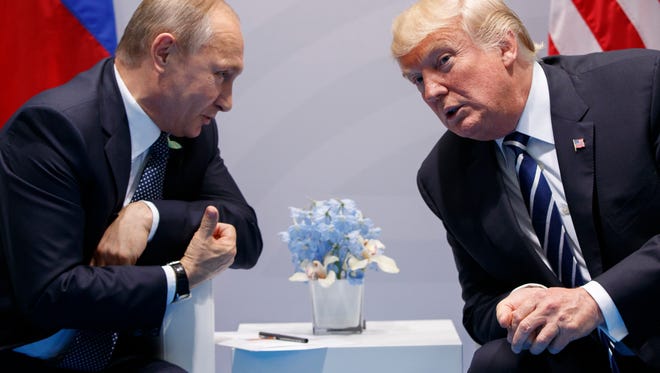Congress strikes deal on Russia sanctions, despite Trump objection
 Doug Stanglin
Doug Stanglin
House and Senate negotiators brushed aside White House objections Saturday and reached agreement on a broad sanctions bill that will make it more difficult for President Trump to unilaterally ease or end punitive measures against Moscow.
The package punishes Russia for meddling in the U.S. presidential elections and for its military aggression in Ukraine and Syria.
The White House had objected to a key section of the bill that would mandate a congressional review if Trump attempted to ease or end the sanctions.
Under the terms of the bill, Trump would be required to send Congress a report explaining why he wants to suspend or terminate a particular set of sanctions. Lawmakers would then have 30 days to decide whether to allow the move or reject it.
The agreement clears the way for passage of the legislation before the August recess, with a vote in the House expected as early as Tuesday.
In Moscow, Dmitry Peskov, spokesman for Russian president Vladimir Putin, called the adoption of the agreement "very negative," the Russian news agency RIA Novosti reported.
Read more:
In 2-hour tweetstorm, Trump claims a president's 'complete power to pardon'
Trump shakes up legal team in face of widening Russia probe
Senate Minority Leader Chuck Schumer called the legislation "strong" and said he expected the legislation to be passed quickly.
"Given the many transgressions of Russia, and President Trump's seeming inability to deal with them, a strong sanctions bill such as the one Democrats and Republicans have just agreed to is essential," Schumer said.
While it could face a presidential veto, Saturday's bipartisan deal suggests that might trigger a backlash by Republican and Democrats who would be able to override his decision.
The agreement resolves difference between House and Senate-passed versions of a broad sanctions bill.
Rep. Steny Hoyer of Maryland, the No. 2 House Democrat, said the final agreement also includes stiff economic penalties against Iran and North Korea.
The sanctions targeting Russia, however, have drawn the most attention because of Trump's persistent push for warmer relations with President Vladimir Putin, despite U.S. findings by U.S. intelligence agencies of Kremlin interference in the 2016 presidential campaign.
Hoyer said the bill would "ensure that both the Majority and Minority are able to exercise our oversight role over the Administration's implementation of sanctions."
"A nearly united Congress is poised to send President Putin a clear message on behalf of the American people and our allies, and we need President Trump to help us deliver that message," said Sen. Ben Cardin of Maryland, the top ranking Democrat on the Foreign Relations Committee.
The House and Senate negotiators also addressed concerns voiced by American oil and natural gas companies that sanctions specific to Russia’s energy sector could backfire on them to Moscow’s benefit. The bill raises the threshold for when U.S. firms would be prohibited from being part of energy projects that also included Russian businesses.
Contributing: Associated Press